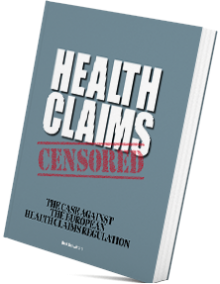11 September 2012
By Bert Schwitters
The problem of traditional health claims that I discussed in my previous articlemust be strictly separated from aspects concerning the safety and quality of the foods and foodstuffs used with respect to these claims. Although, in the European legislation concerning foods, matters of safety and matters of function are sometimes found under one legal “roof,” the safety and function of foods are and should remain autonomous and seperate factors. These factors, when they concern foods, must not be considered and/or regulated in relation to each other. Most certainly not when they concern market entry.
In several important cases,[1] the European Court of Justice explicitly ruled that safety is an autonomous factor. In the context of EU’s General Food Law, this means that food may not be placed on the market if it is unsafe under normal conditions of intended use. Food that is injurious to health is not allowed on the market, not even when its health benefits – if any – outweigh its adverse effects. For example, fish containing more than allowable – potentially unsafe – levels of mercury is not allowed on the market, even when it contains very healthy amounts of omega fatty acids.
This is different in Medicinal Products Law, where safety and function are necessarily dealt with in relation to each other. This is because the intrinsic hazard of (most) medicines does not per se prohibit their market entry as long as the benefits outweigh the side-effects. Medicines need not be as safe as foods, so, when it comes to considering their market entry, the typically pharmacological risk-benefit analysis is applied. This is not done in Food Law, which is why foods, under normal conditions of intended use, never have “side-effects.”
In trying to solve the problem that the Health Claims Regulation is destroying traditional health claims, we should not knee-jerk by adopting an inappropriate pharmacological model that has no place in Food Law. Considerations regarding the function – health benefits – of foods should not depend on considerations concerning their safety and quality. Vice versa, considerations concerning safety and quality should not depend on function.
In view of the foregoing, the current discussion concerning the safety and quality of “botanicals” is wrongly framed. First of all, the discussion is made dependent on function. Secondly, the framing is discriminatory. The Food Supplements Directive 2002/46/EC and Regulation 1925/2006/EC on the addition of vitamins, minerals and of certain other substances to foods, clearly classify “botanicals” as substances other than a vitamin or a mineral having a nutritional or physiological effect, “including, but not limited to amino acids, essential fatty acids, fibre, various plants and herbal extracts.”[2] There is absolutely no reason why “botanicals” deserve special attention when it comes to regulating their safety and quality. If safety and quality must be addressed, we must focus our attention on all “other substances.”
Article 8 of Regulation 1925/2006/EC and Commission Implementing Regulation 307/2012, which explains how and when Article 8 must be applied, provide for a simple and easy to understand procedure that the EU Commission and the Member States may use in case they wish to remove unsafe “other substances” from the internal market. Evidently, this procedure applies to all “other substances” including “botanicals.” Fully proportionate to the low-to-negligible level of risk posed by “other substances,” the European legislature considered that this procedure, which it placed at the fingertips of the Commission and the Member States, provides an adequately high level of protection. All that is required to keep the Union out of harm’s way is that the procedure is used.
In an effort to avoid using the Article 8 procedure, some Member States publish and push “positive lists” of “other substances” – such as “botanicals” – that may be used as or in the manufacture of foods. Ignoring that these Member States violate the Article 8 procedure, some have enthousiastically welcomed the “positive list” approach as the model of choice for harmonising “botanicals.” Regrettably, all harmonising measures aimed at nutrients, “other susbatnces” and their effects on health, have been very detrimental for the food supplement industry and consumers alike.
Although harmonisation is the politically correct thing to do, it standardly raises the costs of doing business, results in products disappearing from the market, short-changes small and medium size companies, and contributes absolutely nothing to the level of protection required in the EU. When “positive lists” are involved, harmonisation also reverses the burden of proof from the Member States to the food business community and shifts what must be proven from presence of harm (authorities) to absence of harm (business community).
If, for unstoppable political reasons, harmonisation (a controlled internal market) must replace the system of mutual recognition (freedom of movement within the internal market), the most proportionate way forward would be a procedure that would allow food business operators to notify to the authorities the – non-novel – “other substances” they currently market, so that eventually, and absent serious safety-concerns brought forward by the Commission or Member States, a positive list with well characterized “other substances” will have a place in an “Article 8” type system.
[1] See inter alia: paragraphs 53 and 61-64 in the Court’s decision in Joint Cases HLH Warenvertriebs GmbH (C-211/03), Orthica BV (C-299/03 and C-316/03 to C-318/03); paragraph 65 in the decision made in Case C-150/00 (Commission of the European Communities v Republic of Austria); paragraph 69 of the decision made in Case C-319/05 (the “Garlic” case).
[2] Recital 1 in Regulation 1925/2006/EC and Recital 6 in Directive 2002/46/EC.




